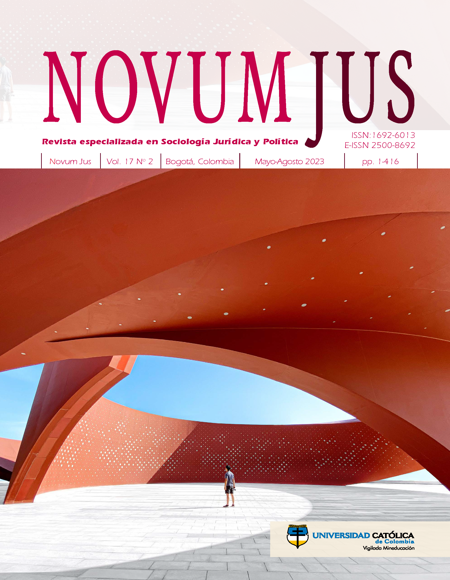
This work is licensed under a Creative Commons Attribution-NonCommercial 4.0 International License.
Authors who publish with this journal agree to the following terms:
- Authors retain copyright and grant the journal right of first publication with the work simultaneously licensed under a Creative Commons Attribution Non-Commercial License that allows others to share the work with an acknowledgement of the work's authorship and initial publication in this journal.
- Authors are able to enter into separate, additional contractual arrangements for the non-exclusive distribution of the journal's published version of the work (e.g., post it to an institutional repository or publish it in a book), with an acknowledgement of its initial publication in this journal.
- Authors are permitted and encouraged to post their work online (e.g., in institutional repositories or on their website) prior to and during the submission process, as it can lead to productive exchanges, as well as earlier and greater citation of published work (See The Effect of Open Access).
Abstract
The correction and resocialization of the convicted person are considered processes of positive changes that occur in his most personality and create readiness for self-directed obedient behavior, as well as the return of the convicted person to an independent and generally accepted social and normative life in society, that is, the successful reintegration into society after release and deprivation of a criminal worldview. This remains one of the most important issues debated by scholars to determine the best way to achieve the goals of corrections and rehabilitation of ex-offenders. In addition, resocialization is of fundamental importance for solving a wide range of social and socio-practical problems, not only for the prevention and eradication of crime but also for the prevention of social deviance in general. Since the reintegration of criminals into society is an urgent social problem, a detailed analysis of the process of resocialization of criminals is of practical importance. The methodological basis of the research was the dialectical, historical, analysis and synthesis, structural-functional, classification and grouping, logical-semantic, comparative-legal, and hermeneutic methods. The purpose of this article is the study of the concept and essence of the legal concept of resocialization, the study of the means of correction and resocialization of convicted persons, the analysis of the experience of foreign countries in the field of resocialization of convicts, the analysis of the priority directions of the Ukrainian social policy on resocialization of persons, and the outline of the ways to improve the state of resocialization of convicted persons in Ukraine.

References
Baulin Y. V. and Tatsii V. Ya. “Tasks of domestic criminal law science in the context of reforming the criminal legislation of Ukraine.” Law of Ukraine 2 (2020): 17-30.
Chaly I. S. Social rehabilitation of convicts. Zaporizhzhia: Classical Private University, 2021. Committee of Ministers of the Council of Europe. “Recommendations N Rec (2003) 23'On the implementation of punishment in the form of life imprisonment and other long terms of imprisonment by the administrations of places of deprivation of liberty'.”https://xn--80aagahqwyibe8an.com/radi-ministriv-komitet/rekomendatsiya-rec-2003-komiteta-ministrov-2003-21955.html (2003).
Denisov S. F. and Zaika D. E. “Correction and resocialization of convicts on the territory of Ukraine in the 19th–20th centuries: theoretical and practical aspects.” Legality Problems 153 (2021): 131-154.
Denisov S. F. and Zaika D. E. “International legal standards regarding the correction and resocialization of convicts.”Bulletin of the Penitentiary Association of Ukraine 1, No. 15 (2021): 49-66.
Denisov S. F., Denisova T. A. and Puzyrevskyi M. V. Criminal law. Dictionary-reference. Chernihiv: Desna Polygraph, 2020.
Forsberg L., and Douglas T. “What is Criminal Rehabilitation?”. Criminal Law and Philosophy 1 (2020): 1-24.
Kutyepov M. Yu. “Correction and resocialization of convicted juveniles: Ways of improvement.” Legal Scientific Electronic Journal 1 (2020): 222-226.
Kutyepov M. Yu. “Regarding some aspects of resocialization of convicts.” Comparative and Analytical Law 4 (2017): 228-231.
Kutyepov M.Yu. “Problems of social adaptation and resocialization of persons released from prisons.” Scientific Bulletin of the Uzhhorod National University. Series “Law” 54 (2019): 156-159.
Mollaie M., Ghayumzadeh M. and Mirkhalili S. “Resocialization and Correcting Criminals in Iran’s Criminal Policy.” IAU International Journal of Social Sciences 8, No. 3 (2018): 19-32.
Navrotskyi V. O. “Cross-cutting and separate concepts of the criminal law of Ukraine.” Law of Ukraine 2 (2020): 81-86.
Peters D. O. “International practice of penitentiary systems.” Domestic Jurisprudence 1 (2017): 44-46.
Shkrabyuk V. S. and Fedyk O. V. “Social and psychological rehabilitation of persons sentenced to imprisonment.” Young Scientist 11 No. 63 (2018): 55-59.
Vasylyk V. V. “Correction and resocialization of those sentenced to deprivation of liberty in the system of means of implementing the tasks of criminal law enforcement.” Legal Journal of the National Academy of Internal Affairs 2 (2020): 33-39.
Verkhovna Rada of Ukraine. “About education.“ https://zakon.rada.gov.ua/laws/show/2145-19#Text (2017).
Verkhovna Rada of Ukraine. “About general secondary education.” https://zakon.rada.gov.ua/laws/show/651-14#Text (1999).
Verkhovna Rada of Ukraine. “About the use of amnesty in Ukraine.” https://zakon.rada.gov.ua/laws/show/392/96-вр#Text (1996).
Verkhovna Rada of Ukraine. “Criminal and Executive Code of Ukraine.” https://zakon.rada.gov.ua/laws/show/1129-15#Text (2004).
Verkhovna Rada of Ukraine. “Criminal codex of Ukraine.” https://zakon.rada.gov.ua/laws/show/2341-14#Text (2001).
Verkhovna Rada of Ukraine. “Criminal Procedure Code of Ukraine.” https://zakon.rada.gov.ua/laws/show/4651-17#Text (2013).
Vorobyev, Yu. A. “National features of the process of resocialization of convicts in the penal system of Germany at the current stage.” Person: Crime and Punishment 3 (2018): 285-289.
Vyunyk M. V. Criminal law regulation in Ukraine: realities and prospects (analytical materials). Kharkiv: Pravo, 2020.
Yakovets I. S., Avtukhov K. A. and Kutiepov M. Yu. Modern criminal enforcement policy of Ukraine: monograph. Kharkiv: Pravo, 2016.
Yaroshenko O. M., Moskalenko O.V., Sliusar A.M. and Vapnyarchuk M.V. “Commercial secret as an object of labour relations: foreign and international experience.” Journal of Legal, Ethical and Regulatory Issues 21 No. 1 (2018).




















